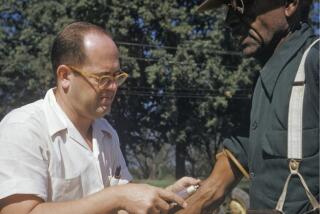CALIFORNIA COMMENTARY : What Color Is Conscience? : Contrary to media assumptions, there is no monolithic ‘black’ take on the guilt or innocence of O.J. Simpson.
- Share via
One of the most interesting revelations from dismissed Simpson juror Jeanette Harris is also one of the least discussed. During her interview with KCAL anchor Pat Harvey, Harris admitted that while she had not yet been persuaded that Simpson was guilty (and noted, rightly, that the trial was nowhere near over and judgment would be premature), she felt there were black jurors who could vote to convict if the evidence was compelling.
This is astonishing--and welcome--news to some of us, as the public has been treated to a steady barrage of coverage assuring us that black citizens are all but constitutionally incapable of passing judgment on one of our own in a rational manner. To be sure, the man-in-the-street surveys show that, by and large, black Angelenos are suspicious of the police and the purity of their motives in this trial, are reluctant to pronounce Simpson guilty early in the game and would be happy and relieved to find Simpson not guilty if the evidence didn’t indicate guilt beyond a reasonable doubt. There is a considerable leap, though, from “I hope he is innocent,” or “I believe the police didn’t play fair in collecting evidence” to “I couldn’t vote to convict him no matter what.”
Black reporters covering the case are acutely aware of the disparity of perception between them and their white colleagues. At a news round-table I participated in a few weeks ago, the anchor pointedly asked, more than once, whether it would be possible for black jurors to convict Simpson if the evidence warranted it. During a commercial break, a black network correspondent who’d been covering the trial for months exploded: “I am so tired of (the anchor) thinking black people will vote their color and not their conscience, I don’t know what to do!” I understood his frustration completely.
Last time I looked, conscience had no color. It would explain why four black people, sickened by the live televised broadcast of Reginald Denny being beaten senseless, ran from their homes through the violence-convulsed streets and worked together to move him to safety. It would explain why an off-duty white fireman jumped into a turbulent runoff drain to pluck two little Latino boys to safety. Why several white people lost their lives as foot soldiers in the war for civil rights. Some people simply feel strongly that they must do the right thing--whether or not it is personally inconvenient. Or dangerous. And race plays no part in that consideration.
I know for certain that this is the case with many black jurors, because I have a personal example. My late father was a fairly conservative World War II veteran who, in middle age, sat on an extremely controversial trial involving three black activists accused of a bombing conspiracy. He voted to convict because, as he told me later, “being black doesn’t save you from being wrong.” He is not alone in that philosophy--nor is it restricted to people his age. A young woman from Compton wrote me recently to say that she hoped black jurors would “do the right thing if the evidence shows (Simpson) is guilty, because being black does not automatically mean being innocent. We African Americans have to grow up and acknowledge that.”
Some people have been acknowledging it all along, but they have not been in front of the lights and microphones. They have been overlooked by those in the predominantly white mainstream media, most of whom have little direct knowledge of black people yet feel competent to blithely explain in national forums how we feel and think.
“When you try to put black people in a little box and say we cannot see beyond color, you insult us,” says Star Jones, a former New York City prosecutor who now hosts the syndicated program “Jones and Jury.” Jones, who won more than 90% of the cases she tried (many of them homicides) says that “as a prosecutor, my preference was to have middle-aged African Americans who were working-class. Those were the most fair people and the ones who were most sick of violence. They do, however, hold you to the burden of proof.” Which she obviously was able to provide.
Contrary to many of the media’s assumptions, black opinion never has been monolithic: “Just like we all vary in shades of color, we also vary in opinion,” Jones points out. “We have had two African American Supreme Court justices at totally opposite ends of the political spectrum-- that should tell you how varied our opinions are.”
It should. Now if we could only persuade white anchors, news producers and analysts to capture the same diversity. Stay tuned.
More to Read
Sign up for Essential California
The most important California stories and recommendations in your inbox every morning.
You may occasionally receive promotional content from the Los Angeles Times.













